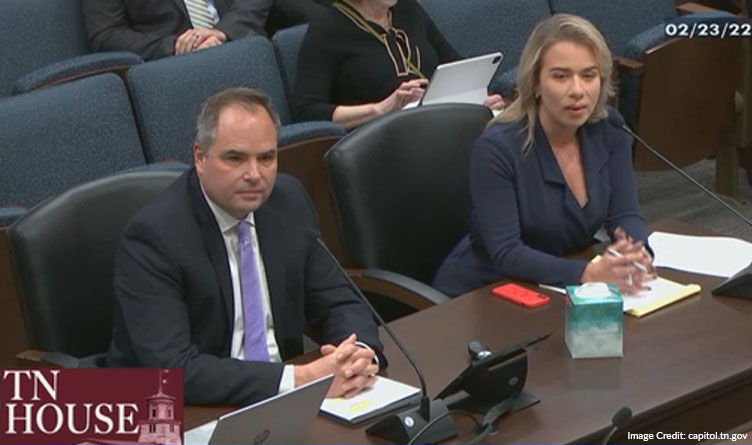Image: Left – James Taylor, President of The Heartland Institute / Right – Samantha Fillmore, State Government Relations Manager Image Credit: capitol.tn.gov
The Tennessee Conservative [By Paula Gomes] –
Representative Dennis Powers’ bill that seeks to designate social media platforms as common carriers and prescribe fines for deplatforming and shadow-banning users has been rolled for two weeks while some amendments are finetuned.
House Bill 2369 (HB2369), in summary, seeks to designate social media platforms as common carriers and requires the entities to obtain certificates of public convenience and necessity from the Tennessee public utilities commission; prescribes fines against social media platforms that deplatform and shadow ban users based on political ideology, viewpoint, or personal animus, or discrimination based on race, creed, color, religion, sex, age, or national origin.
Senator Bo Watson (R-Hixson-District 11) is sponsoring the bill on the Senate side of the legislature.
James Taylor, President of The Heartland Institute and Samantha Fillmore, a State Government Relations Manager from the same organization spoke to the members of the House Business and Utilities Subcommittee yesterday. The Heartland Institute is a non-profit, non-partisan public policy organization that believes in freedom orientated solutions to problems that confront society.
Taylor stated that their organization was neither for or against the bill but also applauded the committee for considering it. He said that people around the country are being censored and they’re very upset that they’re not being provided access to the online version of a public town square.
“Three corporations control 97% social media traffic and they are working together to block points of view they disagree with and that threatens the nature of our democracy,” said Taylor.
He listed some examples of speech that has been censored on the main social media platforms over the last two years such as not being allowed to question the CDC’s “ever shifting statements about COVID” or discussion over whether COVID-19 originated in China or naturally, and other topics that are “political, cultural, scientific or religious.”
Taylor asked, “Is it appropriate for state legislators to address these issues?” To which he replied, “Yes, it is absolutely appropriate for lawmakers to address these issues as without free speech there is no democracy.”
He then invited the subcommittee members to “return to first principles” and quoted Thomas Jefferson from the preamble to the Declaration of Independence.
“We hold these truths to be self-evident, that all men are created equal, that they are endowed by their Creator with certain unalienable Rights, that among these are Life, Liberty and the pursuit of Happiness. That to secure these rights, Governments are instituted among Men…
Free speech, Taylor argued, is certainly part of our unalienable rights. HB2639 would protect those rights. “It is beneficial to the people of Tennessee that action is taken to preserve these basic free speech rights against the threats that currently exist from big tech censorship.”
*** Click Here to Support Conservative Journalism in Tennessee. We can’t cover stories like this without your support!***
Samantha Filmore stated that across America, 77 pieces of legislation from 33 states were introduced in 2021 challenging big tech censorship. She said Tennessee’s common carrier bill is a “new approach.”
Texas and Florida both passed laws last year that were later struck down in appellate courts. She assured the members of the subcommittee that HB2639 is not the same kind of legislation and that Tennessee’s common carrier bill is “very thoughtful.”
She then presented some arguments that others may have against passing the bill:
“States can’t pass legislation such as this because it is a federal issue.”
Fillmore said to some extent it is a federal issue, as it deals with Section 230 of Title 47 of the United States Code enacted as part of the United States Communications Decency Act, but that paragraph 3, subsection E contains an exemption for state based legislation. Fillmore said, “States can make and pass laws as long as it comports with general protections.”
“A bill such as HB2639 is unconstitutional.”
Fillmore said that for that to be correct, any new law would have to be heard by the Supreme court and they would have to strike it down so that statement is “premature and speculative.”
“It doesn’t allow a free market to act the way that free markets should.”
To this argument, Fillmore said that big tech currently enjoys liability protections through Section 230. She went on to say that, “What we see with big tech is not the product of a healthy free market.” The three main social media corporations “unilaterally control free speech on these public platforms” and HB2639 “would correct the corruption in the market in Tennessee for your constituents.”
Fillmore stated that big tech of course has its own right to free speech, but to quote her colleague, “free speech is speaking for yourself, not suppressing others.”
About the Author: Paula Gomes is a Tennessee resident and reporter for The Tennessee Conservative. You can reach Paula at paula@tennesseeconservativenews.com.






One Response
I don’t believe our Forefathers ever anticipated Big Tech manipulation of our media, it’s needed Federal legislation but if the states keep highlighting the problem eventually it may get needed attention. Conservatives are in a fight for preservation of American Freedom’s. We can’t be meek and loose Americanism.